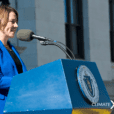Governor Baker’s endorsement of cap and invest for transportation is a positive step forward, can place the state as a climate leader
BOSTON, MA –– Along with 8 other governors and the Mayor of Washington, D.C., the Baker administration announced the beginning of a year-long process to explore a regional cap-and-trade program covering transportation emissions in the Northeast. In the coming year, the Executive branches of these states will collaborate to design “a regional low-carbon transportation policy proposal that would cap and reduce carbon emissions from the combustion of transportation fuels through a cap-and-invest program or other pricing mechanism.” The announcement comes 4 days after the Commission on the Future of Transportation released an extensive report on the state’s transportation needs over the next two decades.
This is a key step forward for the region. Pricing carbon emissions from transportation will reduce pollution, foster green innovation, and create clean job growth. True progress however, will depend on how timely and effectively the design of the program takes place, which will require close and rigorous involvement and examination from engaged legislators, expert organizations, and community stakeholders.
On the announcement, Climate XChange Executive Director Michael Green said, “Massachusetts has the opportunity to lead the nation on clean transportation and pollution reduction by moving forward with carbon pricing. The Governor’s announcement shows not only that we can lead, but that we can do it in a bipartisan way.” He added, “we look forward to learning more about the design and implementation process and how we can continue to work towards a cleaner, safer transportation system in the Northeast.”
In our research on cap and trade programs, we identify several common issues that must be addressed in future cap-and-trade programs, including allowance oversupply, low price collars, and diluted environmental ambition. Given the short timeframe of action to avoid the dire consequences of climate change, as outlined in the IPCC’s recent report, we will be engaging legislators, executives, and stakeholders to help ensure this region gets the kind of policy it desperately needs. Addressing transportation emissions in the region with cap-and-trade will require a more substantive program than we have seen thus far in the United States.
We support the Executive branches of the region coming together to enact a carbon price on transportation emissions. There is strength in numbers, and we hope that through collaboration these states can enact a meaningful carbon price that helps them achieve their respective mandated goals set for 2030 and beyond.








